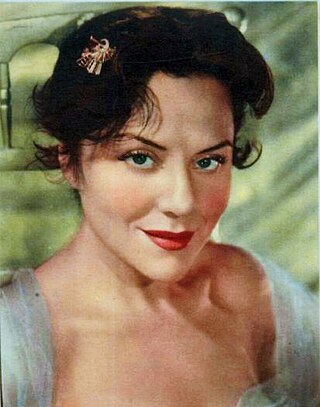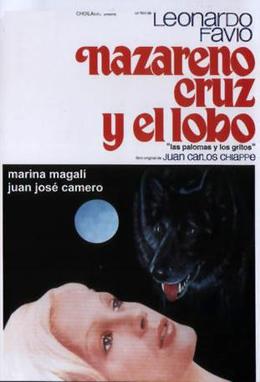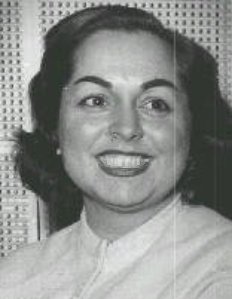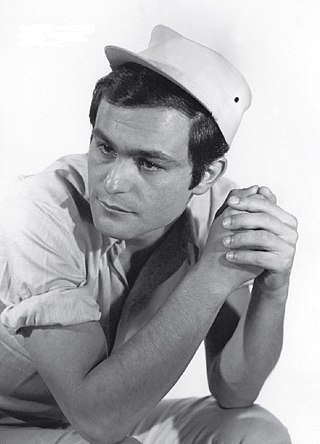
Cinema of Argentina refers to the film industry based in Argentina. The Argentine cinema comprises the art of film and creative movies made within the nation of Argentina or by Argentine filmmakers abroad.

Pilar López de Ayala Arroyo is a Spanish actress. She won a Goya Award for Best Actress for her performance playing Joanna of Castile in 2001 film Mad Love.

Blanca Portillo Martínez de Velasco is a Spanish film, television, and stage actress. She has also worked as theatre director and producer. She made her feature film debut in Entre rojas (1995). She became popular for her portrayal of Carlota in sitcom television series Siete vidas. Portillo is the recipient of numerous accolades, including a Goya Award for Best Actress.

Amelia Bence was an Argentine film actress and one of the divas of the Golden Age of Argentine cinema during the 1930s and 1950s.

Mecha Ortiz was an Argentine actress who appeared in films between 1937 and 1981, during the Golden Age of Argentine cinema. At the 1944 Argentine Film Critics Association Awards, Ortiz won the Silver Condor Award for Best Actress for her performance in Safo, historia de una pasión (1943), and won it again in 1946 for her performance in El canto del cisne (1945). She was known as the Argentine Greta Garbo and for playing mysterious characters, who suffered by past misfortunes in love, mental disorders, or forbidden love. Safo, historia de una pasión was the first erotic Argentine film, though there was no nudity. She also played in the first film in which a woman struck a man and the first film with a lesbian romance. In 1981, she was awarded the Grand Prize for actresses from the National Endowment for the Arts.

La vuelta al nido is a 1938 Argentine psychological drama film written and directed by Leopoldo Torres Ríos and starring José Gola and Amelia Bence. Although upon its release it was harshly received by critics due to its slow and poetic tone, it was reappraised starting in the 1950s-1960s and has since been celebrated as ahead of its time in cinematic modernity and one of the great films of the Golden Age of Argentine cinema.

The House of the Angel is a 1957 Argentine drama film directed by Leopoldo Torre Nilsson based the novel of the same name by his wife Beatriz Guido, who also co-wrote the screenplay.

Nazareno Cruz and the Wolf is a 1975 Argentine fantasy drama film coproduced and directed by Leonardo Favio and starring Juan José Camero, Marina Magali and Alfredo Alcón. It was written by Favio and Jorge Zuhair Jury, Favio's brother and frequent script collaborator. The story works as an adaptation of the classical myth of the Lobizón, and it has become a classic film. It is also widely known as the most successful of all time in its country. With 3.4 million viewers it holds the national record ahead of El secreto de sus ojos.

Pajarito Gómez is a 1965 Argentine comedy film directed by Rodolfo Kuhn. It was entered into the 15th Berlin International Film Festival. It was also selected as the Argentine entry for the Best Foreign Language Film at the 38th Academy Awards, but was not accepted as a nominee. The film is a satire of the promotional machine behind the Argentine pop stars of the 1960s.

Nélida Dodó López Valverde known professionally as Nelly Beltrán was an Argentine actress. She appeared on the radio from the age of 10 and in 85 theatrical performances, 48 films and 3 dozen television shows between 1953 and 1996. She won a Martín Fierro Award as Best Comic Actress for her television work on La hermana San Sulpicio; participated in the film Pajarito Gómez which won the Best Youth Film award at the 15th Berlin International Film Festival; won a Konex Foundation Award; and was honored by the Argentina Actors Association in 2004 for her career contributions.

Secret of the Andes is a 1998 Argentine-American fantasy adventure film co-written and directed by Alejandro Azzano. It stars Roshan Seth as a powerful shaman, Camilla Belle as a nine-year old young girl with unusual gifts, David Keith as her archaeologist father, Nancy Allen as her mother and John Rhys-Davies as a Catholic priest.

Mónica Villa is an Argentine actress of stage, screen, and TV, as well as a researcher and educator. She earned a Best Actress award for her role as "Susana" in cult classic "Esperando la Carroza at the 1985 Festival de Cine Iberoamericano, in Huelva, Spain. She won an ACE Golden award for best leading actress in the 2002 comedy "Ojos traidores", a 2004 Premios Trinidad Guevara for best Actress of a Repertoire Company, a Premios Carlos de Oro for her 2011 performance as best lead actress in the theater production "Jardín De Otoño", and in 2015 a Premios Estrella de Mar for Best Female Performance in a Repertoire Company for "La Nona". In addition, she has been nominated for a Best Actress in a TV Special for the 2003 Premios Martín Fierro, making her acting work recognized in all three major media.

Federico Jusid is an Argentine composer who resides and works between Madrid and Los Angeles. He has written the scores for more than 60 feature films and over 70 television series.

The 100 Greatest Films of Argentine Cinema, also known as the Survey of Argentine cinema, are a series of opinion polls carried out to establish a list of the greatest films of Argentine cinema of all time. The original survey was carried out by the Museo del Cine Pablo Ducrós Hicken in the years 1977, 1984, 1991 and 2000. In 2022, a new edition was held, organized by the film magazines La vida útil, Taipei and La tierra quema, with support from INCAA, the Mar del Plata International Film Festival, the FestiFreak International Film Festival of La Plata, the Casa de la Cultura of General Roca and the Museo del Cine Pablo Ducrós Hicken.

About Everything There Is to Know is a 2021 Peruvian documentary film written, edited and directed by Sofía Velásquez Núñez.

Motherland is a 2023 Peruvian drama film written and directed by Marco Panatonic in his directorial debut. It is about a man from Cusco who wants to study to become an engineer, but he doesn't want to leave his mother and sister, so he will struggle to define his future and identity.

Mirlo's Dance is a 2022 Peruvian documentary film directed by Álvaro Luque and written by Jorge Ossio Seminario and Emanuel Giraldo Betancur. It follows the Amazonian cumbia band Los Mirlos through a journey through the heart of Latin America and remembers its history.

El dependiente is a 1969 Argentine drama film directed by Leonardo Favio and starring Graciela Borges, Walter Vidarte, Fernando Iglesias and Nora Cullen. It is based on the short story of the same name by Jorge Zuhair Jury, Favio's brother and frequent collaborator, with whom he also co-wrote the screenplay alongside Roberto Irigoyen. Set in a small provincial town, the film tells the story of Mr. Fernández, a lonely shop assistant in a hardware store that falls in love with Miss Plasini, a mysterious and isolated woman who lives with her mother. It is the last installment of an unofficial trilogy of films Favio made in the 1960s, after Crónica de un niño solo (1965) and El romance del Aniceto y la Francisca (1967), which have earned him recognition as one of the most important auteurs of Argentine cinema, despite not being so well known outside the country. The film was produced by Leopoldo Torre Nilsson through his company Contracuadro, and was shot in the spring of 1968 in the then small town of Derqui, in the Pilar district of the province of Buenos Aires.

















